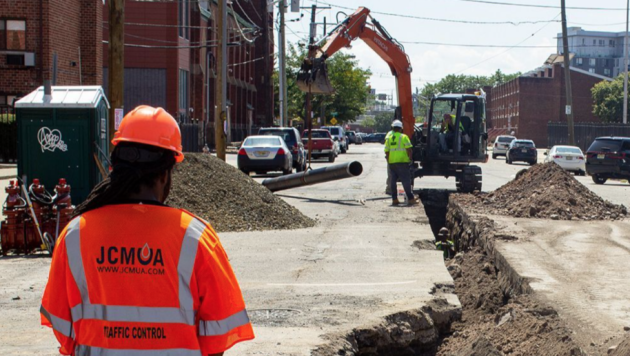The Local Finance Board in Trenton approved $102 million in capital improvements for the Jersey City Municipal Authorities Authority (JCMUA), but not $55 million to extend their franchise fee with the city, at a special meeting this morning.

By John Heinis/Hudson County View
After an hour-long closed session, Matthew Jessup, a member of McManimon Scotland & Baumann, said that the first piece is for $102 million for necessary capital improvements and the second aspect is $55 million for the franchise water agreement with the city.
Jersey City MUA Executive Director Jose Cunha explained the plan in more detail.
“The $100 million that we are seeking would basically be a measure to address the more urgent drinking water infrastructure with the I-Bank [New Jersey Infrastructure Bank] meeting their maximum $40 million cap, which leaves us with no money, conceivably, for the next eight years,” he said.
” … We all know what separates us between a developing company … is a water and sewer company that functions, it’s that simple.”
Cunha further stated that the MUA will spend $1.099 billion over the next decade on sewer and water drinking system upgrades as part of a settlement with the U.S. Department of Justice and the U.S. Environmental Protection Agency, which they announced in January 2022.
Jessup said those specific projects include aqueduct, reservoir, and water main repairs that will take about three years, which he called “a massive logistics challenge.”
He also said the projects can be financed with water revenue bonds on a staggered schedule, noting that the lead service project will cost about $291 million and must be completed by 2031.
Furthermore, Jessup mentioned that the city granted the authority a franchise to operate the water system in 1998. In 2023, a new franchise agreement was signed through the end of 2027.
A five percent water rate increase would also be necessary for the plan to work, consistent with the national average, Jessup added.
Acting Department of Community Affairs Commissioner Jaqueline Suarez said she wanted to know more about the franchise fee and what the benefits are to avoid complete the final four years of the prior arrangement.
“The franchise agreement gets the authority … to collect revenues and issue them to bond holders … If we were to issue bonds today to fund our $102 million capital improvement project, we wouldn’t be able to issue those bonds beyond four years,” Jessup replied.
“It benefits the MUA to extend that franchise agreement for 40 years today to pledge revenues to bond holders for a 30-year term specific to the capital improvements that we discussed today.”
Suarez said that if this is part of the city’s budget action plan, it’s not part of the municipal budget, which at least gives the appearance that the $30 million paid to the city within 90 days will go into their surplus.
She also asked if there was a sewer fee, to which Jessup said there is not since they own it.
During questions from the board, Jessup clarified that the 5 percent water rate increase would be annual, not just one time, an increase of about $750 to $800 per ratepayer over the next decade.
Commissioner Alan Avery asked if the $23 million annual payment to the city could be negotiated down.
“I think this is a better economics to the ratepayer because it costs less,” Jessup answered.
Avery then asked how much the city would receive up front, to which Jessup said it would be $23 million annually, with an additional $30 million in 2023, $10 million in 2024, and $10 million in 2025.
“I have a concern with that, that seems like an excessive amount in mind: your working with the city and the MUA to serve the MUA and ratepayers. It’s unusual to me to have a franchise fee to operate a public agency, I guess we’d need more information on that,” Avery stated.
“I have a concern with that too. The fee, I agree is going to be excessive … I think we need to explore that a little more. Me personally, I am not comfortable,” added Commissioner Idida Rodriguez.
Jessup reiterated that without extending the franchise agreement today, they can’t have bonds that go beyond 2027, which is creates “an untenable debt service number.”
Suarez then asked if there is no publicly issued debt service that extends beyond 2027, to which Jessup said that was the case here.
Avery said he felt that the same thing could be accomplished by negotiating a new deal with the city and not bonding, to which Jessup said that was possible, but they had calculated it would actually be more expensive.
Suarez said that “still doesn’t quite jive,” noting that authorities in the past would issue the debt and guarantee it with water revenues or extending the franchise fee without bonding.
After no one had any public comment or questions, Rodriguez asked if they could go back to closed session, to which Suarez obliged after a unanimous vote (5-0) from the board.
About 15 minutes later, Suarez said the board was not comfortable with the franchise fee and therefore made a motion to approve the capital improvements, but not the franchise fee.
That measure was approved unanimously (5-0).
The October 11th LFB agenda had the proposal at $182 million, but came back today at $157 million.
State Senator Michael Testa (R-1) wrote a letter to the LFB and Suarez on Monday asking them to reject the plan.
“As bad as this is for the people of Jersey City, I am primarily concerned as a member of the State Senate Budget and Appropriations Committee, because the City’s reckless financial games could ultimately end up sticking the State’s taxpayers with the bill through a City takeover or bailout when future local officeholders, taxpayers, and ratepayers become unable to pay for the growing financial mess the current Mayor and his Administration is leaving them,” he wrote.
Suarez also noted that state Senator (R-13) submitted a letter opposing the plan, but neither was read into the record or acknowledged beyond that.
The ordinance regarding the franchise fee deal was scheduled to go before the city council on October 11th, but the measure was carried, as HCV first reported.
The matter is not on this evening’s agenda, with Business Administrator John Metro saying previously that the second reading would be considered at a November meeting.
Former state Assemblyman Jack Ciattarelli, the Republican nominee for governor in 2021 who has signaled he will run again in 2025, also took aim at the application this morning prior to the hearing.
“Something doesn’t smell right. Jersey City’s MUA wants to give the city $50M, on top of $23M annual payment. The MUA charges residents for water & sewer. Is this just a big shell game? NJ’s Local Finance Board should reject the plan!” he tweeted.
Ciattarelli and Jersey City Mayor Steven Fulop, the only declared candidate for governor at the moment, are longtime political rivals and potential opponents in November 2025.










